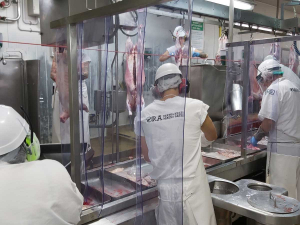Shareholders and suppliers of Alliance Group are upset that the country’s biggest meat processing company did not work during the Easter holiday period while other companies did.
Farmers around the country are experiencing long wait times to get livestock killed as the meat processing sector deals with drought in many parts of the country and slower processing caused by COVID-19 social distancing in place at meat plants.
These problems have been further exacerbated by several winter grazing contracts being cancelled in Southland – and other parts of the country – leaving farmers with nowhere for their animals to winter and now needing to be killed.
In normal years meat plants do not operate over holiday periods such as Easter. However, this year, with the huge backlog of stock to be killed, most meat processing companies – except for the Alliance Group – chose to work over Easter.
“It’s bloody disappointing to hear that Alliance did not kill over Easter, especially when other companies did,” an Alliance supplier told Rural News.
“Over the years, we farmers have dug in their pockets to help the co-operative out and at a time when we need them, they have let us down big time. Many other Alliance suppliers are pretty annoyed as well.”
In a statement to Rural News, the chief executive of Alliance Group David Surveyor confirmed the Easter shutdown.
“The co-operative did not process over Easter and gave our people well-deserved time with their families over what has been a hectic time for them,” he said.
“Our focus has been on keeping Alliance Group’s plants running as smoothly as possible despite the challenging circumstances. We have bedded down the new run modes and are now making incremental increases in processing capacity for farmers.”
Surveyor paid tribute to his workforce who he said “have worked tirelessly to manage a whole range of challenges and ensure we are safely operating our network”.
He added that Alliance would be lifting beef and sheep processing capacity and there would be further opportunities to lift capacity as workers get used to the new configurations.
In contrast, suppliers of Silver Fern Farms have gone to some lengths to praise the meat company’s workforce who did kill over the Easter break. A number of farmers have even made special video tributes to honour SFF workers.
Meanwhile, SFF chief executive Simon Limmer – in an update to suppliers last week – thanked farmers for their patience as the company worked on its new processing capability during the lockdown.
“Our teams have turned their attention to how we can rebound from the current Level 4 processing constraints and return to normal operating levels – or close to normal – knowing that COVID-19 may continue to impact our business,” Limmer explained.
“We are acutely aware that you need direction from us on how long it will take to get stock processed and when we will catch up on the processing backlogs.”
Limmer said SFF had taken several actions to lift current processing levels, including: operating daily overtime and Saturday kills for the foreseeable future; investigating the option of putting on additional chains in some plants, dependent on recruitment, the ability to train and extending the season; and keeping night shifts running longer.
Meanwhile, Limmer conceded that there will continue to be wait times for getting stock killed for some time yet.
He said the current wait time for North Island beef sheep was 2-3 weeks, with the estimated time when capacity will match supply being the first week of May. The South Island beef kill has a 4-6 week wait time, with kill capacity not matching supply until the second week of June.
ANZCO chief executive Peter Conley said the company had operated over Easter.
“To help farmers get stock off farm, especially as feed becomes more challenging in many parts of the country, ANZCO operated its beef plants on three of the four days of the Easter weekend,” he told Rural News.
Conley says the company’s processing sites are operating with new strict controls in place.



















